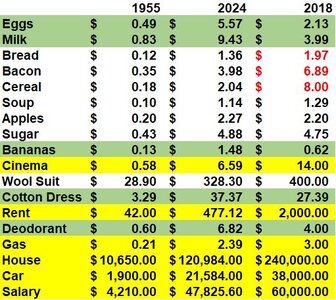NotHardUp1
What? Me? Really?
Pork bellies may be accurate, but not relevant.
I was watching an ancient re-run of What's My Line an hour ago, and they were running the original commercials. Stopette, a deodorant, was the sponsor, and one commercial indicated the price then was 60 cents. That put me to wondering how expensive that was. Stopette sponsored the show for eight years in the 1950's, so I chose 1955 as a fair year to compare inflation or consumer prices.
As cheap as 60 cents sounds, it wasn't compared to today's deodorant. When researching, $1 in 1955 is worth a little over $11 today. Using that as a multiplier, deodorant today would cost almost $7. The average is a lot less than that today, so smelling good is a bargain now compared to the days of Camelot.
Another website compared a bunch of prices from 1955 to 2018, so I used it as a barometer to see change relative to simple inflation. It's not science. It's not the Consumer Price Index. Some of the prices given for 2018 looked more urban than what I know from living in lesser cities (under 1 million).
What jumps out is that little expenses are good deals, meaning you can live on poverty income IF you can find a place to live. You can't afford a car, you can't buy a house, and you can't pay rent if you were just a single person transported forward to our time. Of course, households were single income in 1955, as a rule. So, a fair comparison for MOST people today is two incomes. That says something for gays who are mostly single, and for divorced couples.
Here's a table to see what I mean about consumables. It's cold comfort to see how affordable groceries are when you struggle to pay for roof and transportation. The 1955 & 2018 prices came from the website. The 2024 are projected should-costs using the inflation factors of 2023 vs. 1955.

The reds are just numbers I don't see in my market as average. Bread under $2 would be really bad bread, and I doubt bad bread was sold in 1955. Bacon is closer to $4.50 per pound where I find it, if not buying premium bacon. Cereal at $8 per box would be easily twice the price I see at the grocer.
I was watching an ancient re-run of What's My Line an hour ago, and they were running the original commercials. Stopette, a deodorant, was the sponsor, and one commercial indicated the price then was 60 cents. That put me to wondering how expensive that was. Stopette sponsored the show for eight years in the 1950's, so I chose 1955 as a fair year to compare inflation or consumer prices.
As cheap as 60 cents sounds, it wasn't compared to today's deodorant. When researching, $1 in 1955 is worth a little over $11 today. Using that as a multiplier, deodorant today would cost almost $7. The average is a lot less than that today, so smelling good is a bargain now compared to the days of Camelot.
Another website compared a bunch of prices from 1955 to 2018, so I used it as a barometer to see change relative to simple inflation. It's not science. It's not the Consumer Price Index. Some of the prices given for 2018 looked more urban than what I know from living in lesser cities (under 1 million).
What jumps out is that little expenses are good deals, meaning you can live on poverty income IF you can find a place to live. You can't afford a car, you can't buy a house, and you can't pay rent if you were just a single person transported forward to our time. Of course, households were single income in 1955, as a rule. So, a fair comparison for MOST people today is two incomes. That says something for gays who are mostly single, and for divorced couples.
Here's a table to see what I mean about consumables. It's cold comfort to see how affordable groceries are when you struggle to pay for roof and transportation. The 1955 & 2018 prices came from the website. The 2024 are projected should-costs using the inflation factors of 2023 vs. 1955.

The reds are just numbers I don't see in my market as average. Bread under $2 would be really bad bread, and I doubt bad bread was sold in 1955. Bacon is closer to $4.50 per pound where I find it, if not buying premium bacon. Cereal at $8 per box would be easily twice the price I see at the grocer.


